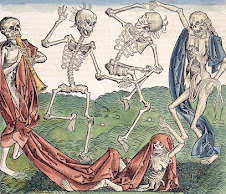Subscribe to:
Post Comments (Atom)
skip to main |
skip to sidebar
This is blog for students of History 102g - Medieval Civilization
Discussion Section Syllabus
History 102g, Medieval Civilization Discussion Section Syllabus
Fridays 9am, 12pm
TAs: Stacey Lutkoski & Ericka Swensson
Email: staceybl@usc.edu, emswensson@yahoo.com
Office: Shrine Offices
Welcome to the discussion section for History 102g. Discussion sections will examine and elaborate on the material presented through the lectures and readings. These classes will help us work through difficult concepts and problematize historical issues. As stated in the course syllabus, the discussion sections are worth 20% of your total course grade. Half of your discussion section grade will be determined by performance in the section itself. In order to receive full credit you need to be present at every class with the readings in hand, be an active participant, and demonstrate a familiarity with the sources.
Cell phone calls, tardiness, inappropriate use of laptops, and other disruptive behavior will not be tolerated and will adversely affect your grade.
Attendance is mandatory. Consult the course syllabus for more information on the attendance policy and penalties.
The second half of your discussion section grade will depend upon your performance in our class blog. Please email Ericka if you have not yet been added to the blog. This is your responsibility, and we will not be held responsible for your negligence. Each week we will post an assignment by Monday evening. You must post a thoughtful paragraph response on the blog by Thursday at 8pm. Late postings will not be accepted. We encourage you to use the blog not only as a place to express your ideas but also as a discussion forum by responding to your classmates’ postings. Your post should neither be a “fact” oriented question/ comment nor a question concerning the content of the works themselves, i.e.: a question that requires outside sources to answer. Rather, your response statement should deal exclusively with the contents of the texts themselves. Also, make sure that you cite the page(s) used for your question or comment.
This syllabus is subject to change. We will communicate with you outside of class primarily through email, and it is your responsibility to check your account regularly for pertinent information. If you have any questions or concerns, feel free to contact either one of us.
Any student requiring academic accommodations based on a disability is required to register with Disability Services and Programs (DSP) each semester. A letter of verification for approved accommodations can be obtained by DSP. Please be sure the letter is delivered to us as early in the semester as possible. DSP is located in STU 301 and is open 8:30am-5:00pm Monday through Friday. The phone number for DSP is (213) 740-0776.
4 comments:
Fame for Beowulf was based on deeds of heroism and self sacrifice (p22) and there were only 2 alternatives: 1)Success 2)Death. Both brought fame - both required that it be enacted in the defense of their nation (pgs4-5) or the killing of a really ugly creature(s) (pg's23,41,67). Beowulf is the emminent example of warrior king - Only the king warrior will go into battle or side by side with his trusted buddy - fight the forces of evil single-handedly (in some cases bare-handed), saves the day, shares his wealth with everyone,and everybody loves everybody. On a serious note, what I see is what has been true since time immemorial: Fame is a lonely, desperate, and fleeting business. Beowulf is a hero (charactter) that I admire and a quality of heart that most search for in life. A noble man! You see examples of fame in "Life of St Martin" (p151) where 'huge crowds' follow him around. Imagine the weightr of responisbility when ever you enter the street, you will be asked to perform a miracle. Did Martin ever doubt himself? What would happen if he failed to exorcise a demon? Would people still believe? In 'Anthony' Athanasius states Anthony is so famous that Constantine and his Sons (pg 59) would do ANYTHING to get a letter with his signature. In the Confessions of Augustine he relays that the noise of PRAISE (close to fame) is a temptation which is almost at the top of the list that keeps Augustine from Gods redemption. Question for Friday: Would you rather have Beouwulfs' or Martin/Augustine/Anthony type fame? Pick your poison!Thanks.
Fame in Beowulf means for a person's name to be passed down, usually through oral tradition, from generation to generation. Glory is highly prized in this society, taking precedence even over life itself. From the numerous examples of “famous” men, even as early as page 8 we can see that these type of men are always warriors, strong, mighty, skilled, of noble descent (pg 9), aged (pg 10), and brave (pg 11). On page 13 Beowulf legitimizes his heroism: “They themselves saw me when, stained with the blood of enemies, I came from battles, when I bound five giants and destroyed their race, and killed water monsters on the waves at night...” This passage shows the ridiculous level of violence and describes the unnatural feats which have to be accomplished to achieve glory. In contrast to Augustine's world where men are known for their intellect and reason, Beowulf's valor is displayed only physically and through acts of war.
Post a Comment